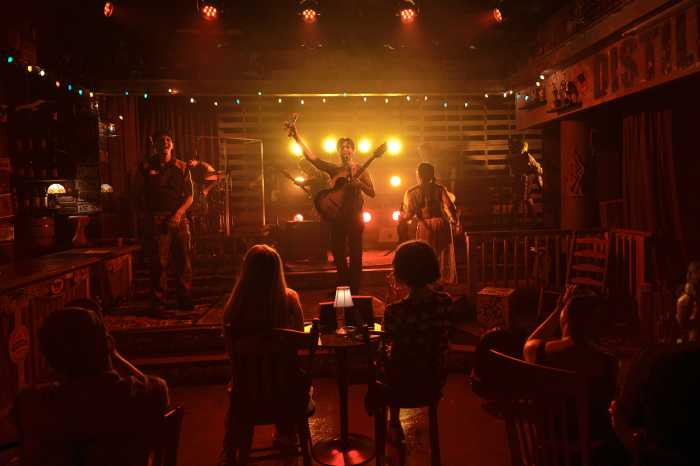The entryway to the Virgil Corporation in “Paradiso: Chapter 1,” Michael Counts’ immersive experience staged at an undisclosed Manhattan location. | CALEB SHARP
BY CHRISTOPHER BYRNE | I am not a fan of company “team building” exercises. And — full disclosure — I used to put together and run them when I was in the corporate world. They range from competitive games to trust exercises to, yes, falling backwards and being caught by colleagues. While they provided an engaging respite from daily work, they never resulted in measurable improvement in team cohesion or productivity.
The exercises were always fashion-driven to some extent, and in 2016 the fashion is for so-called “escape rooms.” You and a group of people go into a room and have a certain amount of time to solve a puzzle to get out. At best, at the end, you drink with your co-workers and “bond” over something more than a review of last quarter’s numbers. At worst, there’s no harm done, and people get to do something different for an hour or so.
To take this concept and try to turn it into “immersive theater,” however, is a ridiculous stretch. It ends up feeling as though an enterprising corporate event company is moonlighting by running more people through its escape room in off-hours — and at 60 bucks a pop.
A Corporate team-building exercise tries to be theater
That, presumably, is how we get to “Paradiso.” The creator and director, Michael Counts, calls it theater and says it was inspired by “The Divine Comedy.” I’m glad they told me that in the press materials because the only thing that recalls Dante is that you are trapped in the offices of the Virgil Corporation, so named for the character of Virgil’s Ghost who appears throughout the epic poem.
You will arrive at a nondescript office building in Koreatown (the exact location is only revealed hours before your experience is set to begin), where you are ushered into a karaoke bar to buy drinks. You are then taken into a closed office where the first of a series of clues are presented. When a clue is solved, you move with your group to the next room and so on. You’ll go through narrow areas, an airshaft (apparently), and a library, until you get to the final room, from which you have approximately 10 minutes to escape. After that, you are ushered out past a janitor’s closet back to a dreary corridor, then a tiny elevator before going on with your life. Since the group I was in figured out the puzzle, I have no idea what happens if the time runs out.
The participants — groups of about 12 — are pushed through the experience by actors who make no bones about the fact that you are on a time schedule. They become downright aggressive at handing out hints if it seems that the group is taking too long, as one expects they need to do since groups begin on the half hour. You also have to give them your cell phone number because in addition to a series of texts before the experience begins, you may get clues sent to you as you’re going through the rooms.
As inevitably happens in this type of event, a group dynamic emerges with some people taking charge, others hanging back, and some simply being obnoxious, largely dependent on the level of pre-event tippling at the karaoke bar.
If one is going to do this, do it with a gang of people you know as a lark. It could be a fun activity with your buds, but as for being legitimate theater? Not even close, no matter how it’s marketed. Also, be advised: the puzzles are not that complicated, and to someone with any experience with this type of game they will feel very much “off the shelf” rather than original and engaging.
There’s one literary element to all this I guess I should concede. By the time you’re done with “Paradiso” you’ll feel that you, like Dante, have been through purgatory.
PARADISO CHAPTER 1 | Midtown venue disclosed day of performance | Schedule varies | One hr., beginning on the half hour | $60; paradisoescape.com



































